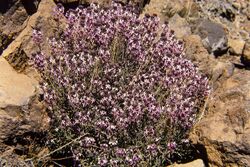Biology:Erysimum scoparium
| Erysimum scoparium | |
|---|---|

| |
| In habitat, Las Cañadas, Tenerife | |
| Scientific classification | |
| Kingdom: | Plantae |
| Clade: | Tracheophytes |
| Clade: | Angiosperms |
| Clade: | Eudicots |
| Clade: | Rosids |
| Order: | Brassicales |
| Family: | Brassicaceae |
| Genus: | Erysimum |
| Species: | E. scoparium
|
| Binomial name | |
| Erysimum scoparium (Brouss. ex Willd.) Wettst.[1]
| |
| Synonyms[1] | |
| |
Erysimum scoparium is a species of flowering plant in the family Brassicaceae, native to the Canary Islands.[1] It is a shrubby species of wallflower with purplish flowers found at high altitudes.
Description
Erysimum scoparium is a small shrubby perennial plant. It has stiff, linear to slightly pointed leaves. The flowers are arranged on upright stems. They darken to a purplish colour as they mature. The seed pods (siliquae) are held more or less erect and have brown seeds. A subspecies, E. scoparium subsp. cinereum has been distinguished by its more erect habit and longer inflorescences. Plants from Gran Canaria have broader leaves and dark brown rather than yellowish brown seeds, and have been separated as E. albescens by some sources.[2]
Taxonomy
Erysimum scoparium was first described, as Cheiranthus scoparius, by Pierre Broussonet in 1809.[3] It was transferred to the genus Erysimum by Richard Wettstein in 1889.[4] Erysimum albescens has been distinguished from E. scoparium by some sources,[2] but this is not accepted by others.[5]
Distribution and habitat
Erysimum scoparium is endemic to the Canary Islands.[1] It is found in montane zones in Tenerife, up to altitudes of 1600–2200 m in Las Cañadas, and 300–500 m in the Valle del Santiado del Teide (subsp. cinereum). It is also found in mountainous regions of La Palma.[2] When E. albescens is included in E. scoparium, the latter's distribution extends to Gran Canaria, where it is found in dry habitats and pine forest at elevations of 1400–1800 m.[2]
References
- ↑ 1.0 1.1 1.2 1.3 "Erysimum scoparium (Brouss. ex Willd.) Wettst.", Plants of the World Online (Royal Botanic Gardens, Kew), https://powo.science.kew.org/taxon/urn:lsid:ipni.org:names:284160-1, retrieved 2018-01-26
- ↑ 2.0 2.1 2.2 2.3 Bramwell, David; Bramwell, Zoë (2001), Wild Flowers of the Canary Islands (2nd ed.), Madrid: Editorial Rueda, pp. 145–146, ISBN 84-7207-129-4
- ↑ "Plant Name Details for Cheiranthus scoparius", The International Plant Names Index, http://www.ipni.org/ipni/idPlantNameSearch.do?id=281106-1, retrieved 2018-03-08
- ↑ "Plant Name Details for Erysimum scoparium", The International Plant Names Index, http://www.ipni.org/ipni/idPlantNameSearch.do?id=284160-1, retrieved 2018-03-08
- ↑ "Erysimum albescens (Webb & Berthel.) Bramwell", Plants of the World Online (Royal Botanic Gardens, Kew), https://powo.science.kew.org/taxon/urn:lsid:ipni.org:names:77062986-1, retrieved 2018-03-08
Wikidata ☰ {{{from}}} entry
 |



